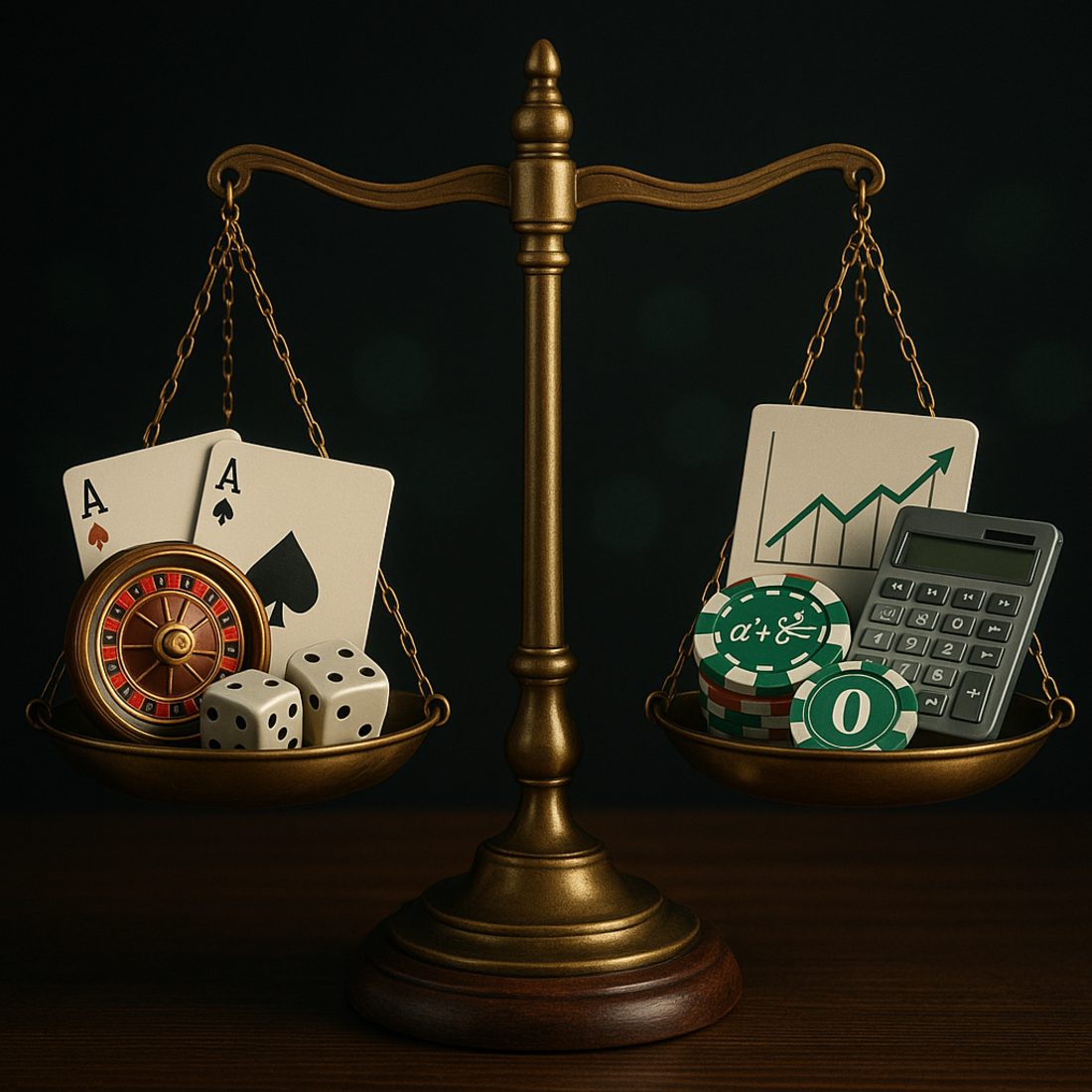What is gambling and how it works — a question many ask when encountering casinos, lotteries, or betting sites. This article breaks down what gambling really means, how it functions behind the scenes, and why people are drawn to it. From slot machines to sports bets, you’ll explore the mechanics, psychology, and rules that define gambling today.

What gambling really means
At its core, gambling means placing a bet — usually money or something of value — on the outcome of an uncertain event. The goal is simple: if you predict the outcome correctly, you win more than you staked. If not, you lose your wager.
This definition covers a wide range of activities, including slot machines, roulette, poker, sports betting, lotteries, bingo, and scratch cards. Whether it’s spinning a reel or guessing a football score, the principle remains the same: risking something for the chance of winning more.
Here’s how gambling typically works:
- The player places a bet — using cash, chips, or virtual credits.
- An event takes place — a spin, a card draw, or an external trigger like a match result.
- The outcome is determined — either by pure randomness (like a slot’s RNG) or external uncertainty (like sports).
- A payout is made — if the bet wins, based on preset odds or prize tables. If not, the stake is lost.
Operators — whether casinos or bookmakers — make money through a built-in advantage. In casinos, this is called the house edge — a small statistical margin that ensures profit over time. In sports betting or poker rooms, they may charge fees or take a percentage (rake) from each bet or pot.
Ultimately, gambling relies on probability, randomness, and financial risk. It’s not just about luck — it’s a system built around odds, expected value, and long-term margins.
Types of gambling: from lotteries to casinos

Gambling comes in many forms — from pure games of chance to formats that mix randomness with strategy. Here’s a breakdown of the main categories and how they differ in mechanics and player involvement.
Casino games (slots, roulette, blackjack)
Casino games are the classic face of gambling:
- Slots are entirely chance-based: you spin the reels, and outcomes are determined by random number generators (RNGs).
- Roulette is also pure luck — you place bets on numbers, colors, or sections, and a spinning wheel decides the result.
- Blackjack, on the other hand, involves both chance and decision-making. Players who understand strategy can slightly reduce the house edge.
Card-based gambling (poker, baccarat)
These games revolve around cards, but the gameplay differs drastically. Poker is unique among gambling games: it’s based on skill, psychology, and long-term strategy. Randomness plays a role in the cards dealt, but experienced players can consistently outperform weaker opponents. Baccarat, by contrast, is closer to roulette in feel — players bet on outcomes (Player, Banker, or Tie), and cards are drawn according to fixed rules. It’s fast, simple, and mostly luck-driven.
Sports betting and live betting
Here, you bet on real-world events — football, tennis, horse racing, and more. Outcomes depend on the performance of athletes or teams, making sports betting a hybrid: it’s partly analytical (stats, trends, odds) and partly unpredictable. Live betting adds a dynamic twist — placing bets during the game as odds shift in real time, adding excitement and complexity.
Lotteries, scratch cards, bingo
These are pure games of chance — simple, accessible, and widely played. Lotteries involve picking numbers for a scheduled draw. Scratch cards offer instant results with no strategy involved. Bingo introduces a minor interactive element, but the outcome still relies entirely on randomly drawn numbers.
Modern formats (virtual sports, crash games, fantasy sports)
The digital age has introduced new types of gambling:
- Virtual sports simulate real matches using RNGs — like betting on a digital football game.
- Crash games involve high-speed risk decisions, where players try to cash out before a multiplier “crashes.”
- Fantasy sports are skill-heavy, requiring player selection and long-term team management, but they still include an element of uncertainty through real-world performance.
From high-risk slots to strategic fantasy leagues, gambling spans a spectrum of formats. Some are instant and random, others require knowledge, timing, or prediction — but all involve putting something at stake in hopes of a win.
How gambling systems work

Behind every gambling game lies a structured system — one that governs fairness, risk, and the long-term balance between players and operators. Understanding how these mechanics function reveals why the odds are never random in the long run — even if each individual outcome is.
Randomness and RNGs
In digital games like online slots, roulette, and lotteries, fairness is ensured by random number generators (RNGs) — algorithms that produce unpredictable outcomes without bias. These systems are regularly tested by independent auditors to guarantee that every spin or draw is statistically random and not manipulated. In physical games, randomness comes from mechanical elements like shuffled cards or a spinning wheel.
House edge & odds
Every gambling operator builds in a mathematical advantage — known as the house edge. This is the percentage the casino expects to earn from each bet over time. For example, in roulette, the presence of a “0” on the wheel gives the house its edge. Even games that offer player choices — like blackjack or sports betting — are designed to favor the house statistically across many rounds.
Skill vs chance
Some gambling activities — such as poker or fantasy sports — allow skilled players to improve their outcomes. Strategic decisions, experience, and game theory can influence long-term success. However, no level of skill can eliminate risk entirely. Every game includes elements of chance, and even the best players face unpredictable outcomes in the short term.
Probability and risk
Gambling is built on probability — the likelihood of a specific result happening. Payouts are tied to odds: the lower the chance of success, the higher the potential reward. But this also means higher risk. Winning is never guaranteed, and over time, probability ensures that the house stays profitable. For players, managing risk — not eliminating it — becomes the core challenge.
Why people gamble: motivation and psychology
To truly grasp what is gambling and how it works, it’s important to look beyond the games and focus on human behavior. People don’t gamble just to win — they gamble because it fulfills emotional, psychological, and even behavioral needs. Whether it’s the thrill of risk, the promise of reward, or the urge to escape boredom, gambling taps into core human motivations. Understanding these drives helps explain both its appeal and its potential dangers.
The thrill of uncertainty
One of the strongest motivators is the excitement of not knowing what comes next. The suspense of a spinning wheel or a turning card activates brain areas linked to adrenaline and dopamine — creating a rush that mimics other high-stimulation activities. This unpredictability is a key part of gambling’s emotional pull.
The lure of a quick win

Even if the odds are low, the potential for sudden financial gain draws many players in. For some, gambling offers a dream of freedom — a jackpot that could change everything. The intermittent nature of wins (small but unpredictable rewards) reinforces this drive, making each near-miss feel like you’re getting closer.
Game mechanics and engagement
Modern gambling is designed with engagement in mind. Features like progress bars, levels, sound effects, and animations create a game-like environment that feels interactive and rewarding — even when no money is won. This gamification blurs the line between entertainment and risk, keeping players immersed for longer.
Emotional release and routine
For others, gambling becomes a form of emotional escape. It can be a way to unwind, fill time, or distract from stress. In some cases, regular play turns into habit — a go-to activity to deal with boredom, loneliness, or frustration. Over time, the behavior can become automatic, even when the original motivation fades.
By tapping into the reward systems of the brain, gambling creates powerful emotional cycles that make people return again and again. That’s why it’s not just a game — it’s a deeply psychological experience, and one that benefits from mindful awareness and control.
Legal, social, and financial aspects
Gambling is not just a private activity — it intersects with laws, social dynamics, and personal finances. Understanding the broader context helps players stay informed, protect themselves, and make responsible choices.
Legality and regulation
Gambling laws vary widely across countries and regions. Some governments fully legalize and license gambling through strict regulatory bodies (like the UKGC or MGA), while others prohibit it outright. A licensed gambling environment ensures fair play, transparent odds, and systems to protect users. Wherever you play, checking for a valid license is the first step toward safety.
Problem gambling and addiction

For some, gambling shifts from entertainment to harmful behavior. Problem gambling is a recognized psychological issue where the urge to bet becomes compulsive, leading to emotional distress, financial harm, and strained relationships. Warning signs include chasing losses, hiding gambling, or losing control over time spent on games. It’s not about weak willpower — it’s a serious condition that needs attention.
Financial planning and bankroll management
Every bet carries risk. That’s why setting a clear gambling budget — your bankroll — is essential. Responsible players define limits on how much they’re willing to lose and never treat gambling as a way to make income. Good bankroll management means playing within your means, avoiding chasing losses, and never using borrowed money.
Responsible gambling and player support
Most regulated platforms now include tools to support responsible gambling:
- Deposit and time limits
- Loss reminders
- Session time-outs
- Self-exclusion (temporary or permanent)
Many also partner with support organizations that help players experiencing gambling harm (e.g., GamCare, BeGambleAware). These measures are not just policies — they’re lifelines that protect players from potential harm.
Legal protections, social responsibility, and personal financial discipline form the backbone of a healthy gambling experience. Recognizing these layers isn’t just smart — it’s vital for staying safe and in control.
Now that you understand what is gambling and how it works, you’re better equipped to approach it thoughtfully. Knowing the structure behind games, the reasons people play, and the risks involved allows you to stay informed, play responsibly, and avoid common pitfalls — turning chance-based entertainment into a conscious and safe experience.
